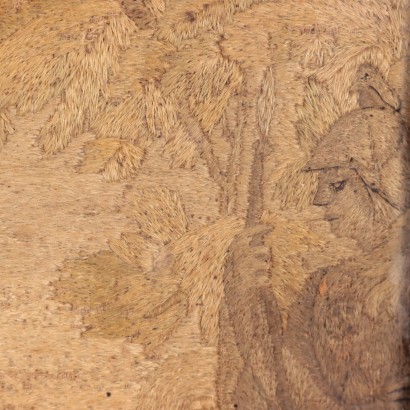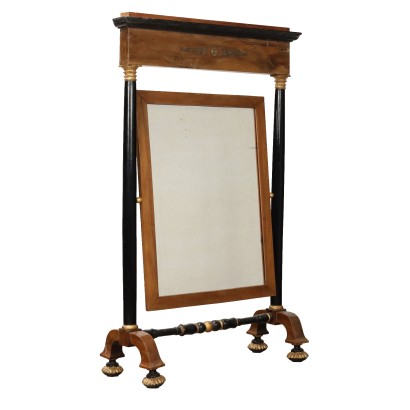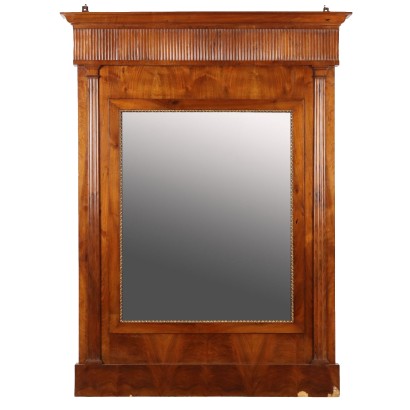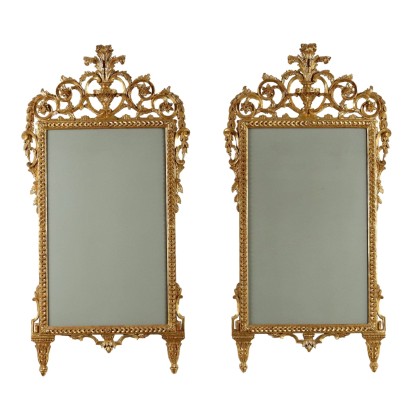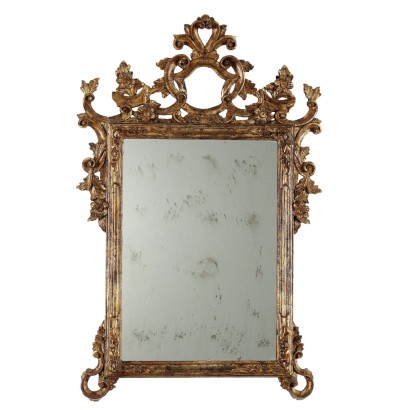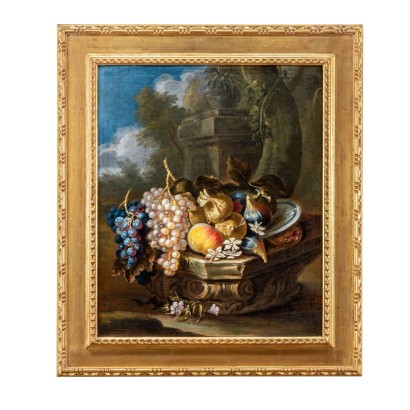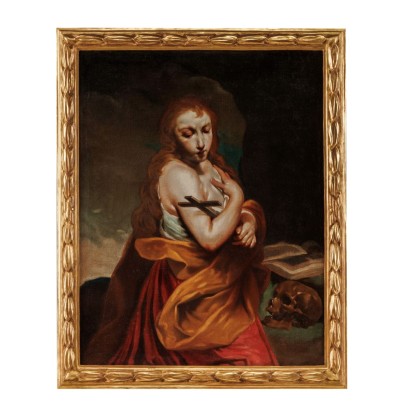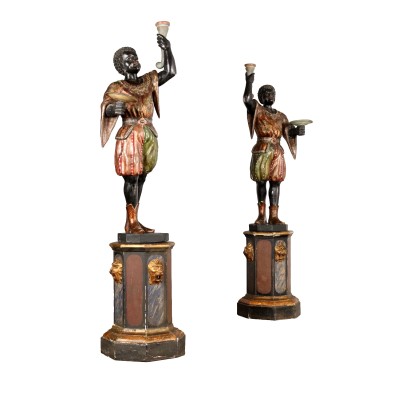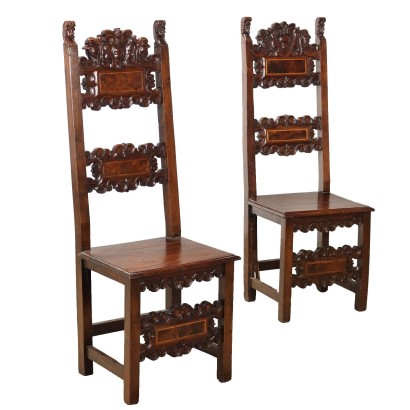Plato's Academy Silk Tapestry Italy XVII-XVIII Century - Central Italy Late 17th-early 18th century
Features
Central Italy Late 17th-early 18th century
Age: 18th Century / 1701 - 1800 , 17th Century / 1601 - 1700
Origin: Central Italy
Description
Small silk tapestry, with some applied inserts in painted canvas, corresponding to the faces and hands of the characters. The scene depicts Plato's Academy, with the philosopher sitting on the ground, his back against a tree, dressed in a cassock and a mantle that drapes him, with his right hand holding a tablet or parchment. He is intent on carrying out a philosophy lesson, with the young students who surround him and with one of whom he is speaking in particular. Behind a rural landscape inhabited by men who are doing agricultural work: some intent in sowing, some in harvesting and some, again, in cutting down a tree with an ax. In the background, to the right of the main group, a turreted construction can be seen, while to the left an ancient herm. Inserted in a coeval frame, molded in several orders with ebonized parts alternating with others veneered in tortoiseshell.
Product Condition:
Product in fair condition showing some signs of wear.
Dimensions (cm):
Height: 56
Width: 65
Depth: 6
Additional Information
Notes historical bibliographic
Both the small tapestry and the tortoiseshell frame are two artifacts dating back to the end of the 17th century, beginning of the 18th century. In fact, the use of the turtle began to spread in this century. The use of the animal's carapace was in fact used to decorate wünderkammer objects, both for the refined plays of color that could be created, and as an exotic material. The scene represented is recognizable thanks to the typical iconography of Plato, that is a philosopher, a wise man with a mature appearance with a white beard, wearing a dress with a classic style. It has a phylactery as an attribute, in memory of the writings he wrote; in our case he is also surrounded by young people attentive to his lessons, with whom he is discussing his own philosophical research. The classical herm in the background is also interesting, to remember Socrates, the teacher on whose doctrine Plato's thought was based. Great attention has been paid to the method of realization, which sees the alternation of embroidered parts to create the landscape and the figures, while the faces, arms and feet of the characters are painted on canvas, applied on the tapestry itself.Age:
18th Century / 1701 - 1800
18th Century / 1701 - 180017th Century / 1601 - 1700
17th Century / 1601 - 1700Other customers have searched:
Specchiera, caminiera, frame, cornice, ventole, specchi, psiche, specchiera basculante, specchio d'appoggio, applique..
Se ti interessano specchi, specchiere, psiche, toilette, dai un'occhiata ai nostri approfondimenti sul blog e presentazioni su FineArt
Leggi di più
Una coppia di specchiere a cavallo tra barocco e barocchetto
Il nuovo gusto nel Granducato di Toscana tra Rococò e Neoclassicismo in una specchiera intagliata
Una elegante specchiera intagliata e dorata, espressione dello stile Regency
Il fascino senza tempo della Toilette
Un reimpiego di qualità: da trumeau a specchiera
Caminiera Neoclassica, Firenze, ultimo quarto XVIII secolo
Specchiera Neoclassica, Firenze, fine XVIII secolo
Coppia di Specchiere Irlandesi, in Stile Giorgio III, seconda metà XIX secolo
Specchiera Cinese, Ultimo Quarto XVIII Secolo
Consolle Parietale con specchi
Consolle inglese, metà XIX secolo con specchi
Caminiera Impero, Lombardia, primo quarto XIX secolo
Psiche Impero, Francia, primo quarto XIX secolo
Cornice laccata, Veneto, ultimo quarto XVIII secolo
Specchiera Barocca, Bologna Inizio XVIII Secolo
Specchiera a Cassetta, Bologna Inizio XVIII Secolo
Cornice edicola, Venezia, XVI secolo
Sull'antiquariato in generale dai un'occhiata anche a:
Classic Monday: da un pezzo dei nostri magazzini alla storia dell'antiquariato
L'antiquariato dalla A alla Z: il Dizionario dell'Antiquariato
Il dizionario dell'antiquariato - Lastronatura
Il dizionario dell'antiquariato - Mascherone
Il dizionario dell'antiquariato - Natura morta
Il dizionario dell'antiquariato - Opificio
Il dizionario dell'antiquariato - Pastiglia
Il dizionario dell'antiquariato - Savonarola
Il dizionario dell'antiquariato - Rosone
Intaglio barocco con motivo a ricciolo
Leggi di più
Una coppia di specchiere a cavallo tra barocco e barocchettoIl nuovo gusto nel Granducato di Toscana tra Rococò e Neoclassicismo in una specchiera intagliata
Una elegante specchiera intagliata e dorata, espressione dello stile Regency
Il fascino senza tempo della Toilette
Un reimpiego di qualità: da trumeau a specchiera
Caminiera Neoclassica, Firenze, ultimo quarto XVIII secolo
Specchiera Neoclassica, Firenze, fine XVIII secolo
Coppia di Specchiere Irlandesi, in Stile Giorgio III, seconda metà XIX secolo
Specchiera Cinese, Ultimo Quarto XVIII Secolo
Consolle Parietale con specchi
Consolle inglese, metà XIX secolo con specchi
Caminiera Impero, Lombardia, primo quarto XIX secolo
Psiche Impero, Francia, primo quarto XIX secolo
Cornice laccata, Veneto, ultimo quarto XVIII secolo
Specchiera Barocca, Bologna Inizio XVIII Secolo
Specchiera a Cassetta, Bologna Inizio XVIII Secolo
Cornice edicola, Venezia, XVI secolo
Sull'antiquariato in generale dai un'occhiata anche a:
Classic Monday: da un pezzo dei nostri magazzini alla storia dell'antiquariato
L'antiquariato dalla A alla Z: il Dizionario dell'Antiquariato
Il dizionario dell'antiquariato - Lastronatura
Il dizionario dell'antiquariato - Mascherone
Il dizionario dell'antiquariato - Natura morta
Il dizionario dell'antiquariato - Opificio
Il dizionario dell'antiquariato - Pastiglia
Il dizionario dell'antiquariato - Savonarola
Il dizionario dell'antiquariato - Rosone
Intaglio barocco con motivo a ricciolo
Product availability
The product can be seen at Cambiago
Immediate availability
Ready for delivery within 2 working days from ordering the product.








